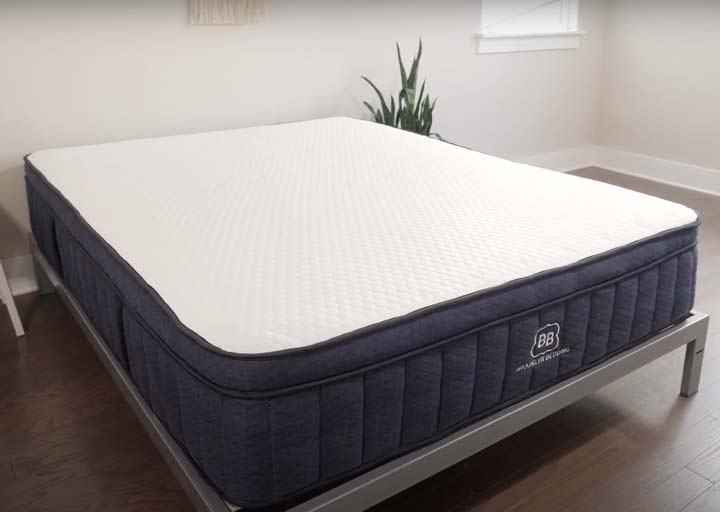When it comes to sleep, the more relaxed you are, the better your sleep. Trying to sleep with a bloated stomach can cause distress for even the best or heaviest sleepers. However, finding a comfortable sleeping position can make a big difference in alleviating some of the tightness and pressure associated with a bloated stomach. Read on to learn more.
What Causes Bloating in the Stomach?
A bloated stomach is caused by the buildup of intestinal gas, which is a natural byproduct of digestion. Too much intestinal gas can create digestive disturbance, pressure, tightness, and a full feeling. Those with food sensitivities and gastrointestinal issues are more likely to experience bloating.
Everyone might experience a bloated stomach differently. For some, it might be noticeably distended, while others may have no outwardly visible symptoms. Either way, it can be uncomfortable. And if it occurs at night, it can make it harder to sleep.
Bloating is also quite common. One older study found that bloating and distention are reported by 96% of IBS (irritable bowel syndrome) sufferers, 20-30% of the general population, and 75% of women who menstruate.
Potential Causes of a Bloated Stomach
Bloating may result from a number of factors. Here are some of the most common ones:
- Hormonal Fluctuations – The menstrual cycle can cause many people to feel bloated. Rising estrogen levels can make some people retain water, and the increased volume in the uterus can make people feel bloated.
- Digestive Issues – Conditions that affect your digestive tract can also cause bloating. For example, small intestine bacterial overgrowth (SIBO) puts the gut flora out of balance and can make people feel bloated, nauseous, and fatigued. fructose and gluten. Irritable bowel syndrome (IBS) is another common digestive issue that affects the stomach and intestines. Common side symptoms include abdominal pain, bloating, and changes in the frequency of bowel movements.
- Food Intolerances – Many people are intolerant to certain foods and ingredients, which can cause bloating. Some common food intolerances include lactose,
- Diet – What you eat and how you eat may cause you to feel bloated. For example, high fiber diets may make people feel bloated, and this 2020 study suggests that substituting fiber with protein can help alleviate bloating. Eating too quickly can also cause bloating.
- Constipation – When stool stays in the colon for a long time, the bacteria can ferment and cause gas and bloating.
- Bowel Obstructions – When there’s a partial or complete blockage of the small or large intestine, it can cause bloating and abdominal pain. This condition can make it difficult to have bowel movements, which can lead to serious complications.
- Motility Disorders – These types of digestive problems happen when gut nerves and muscles stop working effectively. Common symptoms include abdominal pain and swelling, difficulty swallowing, nausea and vomiting.
How to Get Rid of a Bloated Stomach
A bloated stomach can leave you feeling uncomfortable and unable to sleep. There are remedies that can help ease a gassy and bloated stomach. These can include prescription medication (for IBS or GERD), over-the-counter medication (like Simethicone or Lactase), and natural treatments (like ginger or cinnamon). Some therapies are more effective when targeting the issue on the spot, while other treatments are more useful for long-term relief. Those who have IBS and other chronic conditions will need long-term solutions.
Examples of Quick Remedies for a Bloated Stomach
• Peppermint Oil: According to older research, peppermint oil noticeably reduced bloating and distention compared to a placebo. Essential oils and herbs like peppermint are antispasmodics and can help your intestinal muscles relax so that you can pass gas more easily.
• Herbal Tea: Herbal teas such as peppermint, fennel, chamomile, and ginger have an antispasmodic effect. Drink them after a meal or sip them throughout the day to help support digestion.
• Dandelion Tea: Dandelion tea has a wonderful bitter flavor like coffee, and it is a diuretic, meaning it can help your body get rid of excess water.
• Magnesium Oxide: Magnesium oxide has been shown to help relieve constipation. Apart from having a natural laxative effect, magnesium also helps to relax the intestinal muscles and neutralize stomach acid.
• Activated Charcoal: There’s some evidence that activated charcoal can be helpful for those who are looking for some quick relief. When activated charcoal comes into contact with stomach gas, it traps the gas molecules in tiny gaps found on the charcoal’s surface. This essentially locks the gas away safely and allows it to be passed smoothly in a normal digestive process.
• Simethicone: Simethicone, like the brand name Alka-Seltzer, is an anti-foaming agent that may help alleviate bloating caused by gas.
Long Term Remedies for Bloating
• Rule out a serious health issue. Underlying conditions may be triggering or worsening your bloating. Talk with your doctor to find out if you could be experiencing a condition like functional dyspepsia, irritable bowel syndrome, or chronic idiopathic constipation.
• Adjust your diet. What you eat is one of the biggest contributors to your digestive health and how you feel. Consider trying a low-FODMAP diet, which is often successful for reducing bloating, or another elimination diet that may help you identify food triggers. Consult with a registered dietitian who can help personalize your plan.
• Prebiotics and probiotics. These are intended to help support a healthy balance of your gut microbiome, or the community of microbes that live in your digestive tract. A healthy gut microbiome is less likely to trigger bloating. You can find naturally occurring probiotics and prebiotics in fermented foods (tempeh, miso, natto and kefir) as well as foods like garlic, onion, leeks, artichoke, and bananas.
• Tumeric, derived from the Curcumin longa plant, and its bioactive compound curcumin, have been shown to have a significant positive effect on abdominal pain and discomfort with IBS patients.
• Boost your fiber intake. Fiber is a critical nutrient to support gut health and digestive regularity, which can also help keep bloating at bay. Increase dietary fiber gradually by getting a daily intake of fruit, vegetables, whole grains, nuts, seeds, and legumes.
• Castor oil, a vegetable oil made from castor beans, can be an effective laxative. Some research suggests it can control symptoms related to constipation and help decrease bloating.
• Move your body. Getting adequate exercise and gently stretching can help decrease stress and assist the digestive tract in processing the food.
Best Sleeping Positions for a Bloated Stomach
Side Sleeping
Side sleeping is a great position to choose if you are experiencing from stomach distress and bloating. Although there is little research to support the benefits of sleeping on one side vs another, a study from the Journal of Clinical Gastroenterology showed people with acid reflux issues had a higher incidence when they slept on the right side versus the left.
Beds for Side Sleeping with a Bloated Stomach

|

|

|

|

|

|

|

|

|

|
|
| Helix Midnight Mattress | Saatva Classic | Nectar Premier Mattress | WinkBed Mattress | Nolah Evolution Hybrid Mattress | Nectar Luxe Mattress | Bear Elite Hybrid Mattress | Brooklyn Bedding Aurora Luxe Mattress | Brooklyn Bedding Titan Plus Luxe | Leesa Sapira Chill Hybrid | |
| Rating | ||||||||||
| Firmness | Medium-firm: 7/10 | Multiple firmness options | Medium-firm: 6.5/10 | Multiple firmness options | Multiple firmness options | Soft: 6/10 | Multiple firmness options | Multiple firmness options | Medium-firm: 6.5/10 | Multiple firmness options |
| Material | Hybrid | Innerspring | Foam | Hybrid | Hybrid | Foam | Hybrid | Hybrid | Hybrid | Hybrid |
| Cooling | — | — | — | — | — | |||||
| Best For |
Side Sleepers,
Back Sleepers, Couples |
Back Sleepers,
Stomach Sleepers, Hot Sleepers |
Side Sleepers,
Back Sleepers, Stomach Sleepers |
Side Sleepers,
Back Sleepers, Stomach Sleepers |
Side Sleepers,
Back Sleepers, Hip Pain |
Side Sleepers,
Back Sleepers, Hot Sleepers |
Side Sleepers,
Back Sleepers, Hot Sleepers |
Side Sleepers,
Hot Sleepers, Back Pain |
Side Sleepers
|
Side Sleepers,
Back Sleepers, Stomach Sleepers |
Left Side Sleeping
Left side sleeping is often regarded as better for digestion and a bloated stomach. Gravity and physiology are both at play in this position, since the stomach is positioned on the left side of the body. Gravity can help waste move with greater ease through the digestive tract from the small intestine to the large intestine. This can help to ease discomfort from gas, bloating, and other digestive discomforts.
Side Sleeping with a Pillow Between the Legs
Using a pillow between your knees can be a life-changing addition to your sleep hygiene. It can make side sleeping much more comfortable by keeping the hips and lower spine in proper alignment.
Back Sleeping
Back sleeping can be helpful to ease pain because it distributes the weight of the body evenly and helps keep the spine in a stable neutral position. But it is not ideal for folks who have overweight, are pregnant, or experience back pain.
Back Sleeping With a Pillow Under Your Knees
If you don’t have a supportive mattress, you could try to elevate your legs using a stable pillow under your knees. This will help take pressure off of your lower back and allow the stomach to spread, relax, and possibly help relieve some gas.
Back Sleeping with an Elevated Head and Torso
If your stomach bloating is caused from acid reflux or GERD, or you are a snorer, back sleeping could increase your symptoms, unless you elevate your head and chest. This will help keep the sinuses clear and reduce snoring. It will also make it more difficult for the acid to inch back toward your throat.
Worst Sleeping Position for a Bloated Stomach
Stomach sleeping is considered to be the worst sleeping position for many people, including those suffering from indigestion or a bloated stomach. This position exerts extra pressure on the stomach and can create strain on the neck and shoulders.
When you lie on your stomach, the weight of your body is naturally pressed deeper into the mattress and puts more strain on your lower back. Stomach sleeping can create even more stress on a bloated stomach. If you must sleep on your stomach, be sure you have a low loft pillow so that your spine isn’t tossed out of alignment.
How Sleep Impacts Gut Health and Digestion
Research that looked at the quality of sleep over one month showed that a diverse gut microbiome promoted healthier sleep through the gut-brain microbiome axis (GBMA) in healthy males. The GBMA is bi-directional. This indicates that your psychological state (including sleep) can alter gut health as much as gut bacteria can influence health and habits. This study also pointed to specific bacteria that are present in the gut, which are associated with healthier sleep and helping regulate circadian rhythm.
Sleep disturbances such as insomnia, shorter sleep times, and frequent sleep awakenings are common among people who suffer from IBS. Poor sleep quality and quantity has been associated with several illnesses, including cancer, type 2 diabetes, and Alzheimer’s. These diseases can promote an imbalanced gut microbiome over time, which can lead to digestive issues such as bloating, stomach pain, diarrhea, and constipation.
There is a clear link between poor sleep and the gut microbiome. Lack of sleep can create a cascade of issues ranging from hormonal imbalances to a lack of diverse and robust gut flora. Gut health should be top of mind when trying to improve your sleep hygiene. Digestive issues including bloating, stomach pain, diarrhea, nausea, and constipation are all intimately related to our gut microbiome.
Is It Bad to Eat Before Bed?
Most experts recommend eating no fewer than three hours before bed so that your body has time to digest the food properly. However, you should not go to bed hungry either. A protein-rich snack can be ideal to reduce nighttime waking and to feel better rested and more satiated in the morning. Try a hard-boiled egg, some sliced turkey or a banana with peanut butter.
FAQs
Can a lack of sleep cause stomach bloating?
Poor sleep, over time, may increase your likelihood of experiencing digestive health issues like bloating.
Does eating sugar before bed affect sleep?
Studies show that eating sugar before bed wreaks havoc on your sleep by spiking the hormones insulin and cortisol, which both arouse you from your sleep or keep you from falling asleep.
What foods are easy to digest and promote sleep?
Protein-rich foods such as oily fish, poultry, beef, eggs, seeds, nuts, milk and soy are plentiful in tryptophan, an amino acid that helps promote sleep by supporting your body’s production of melatonin and seratonin. Tryptophan needs carbohydrates to help carry it to the brain, so try eating foods that have tryptophan and carbohydrates together. Try a handful of mixed nuts and seeds with fresh fruit, a cup of warm spiced milk, or a small amount of turkey with a few tart cherries to help enhance your sleep. Tart cherries contain phytonutrients as well as tryptophan and melatonin, which may help support sleep.
